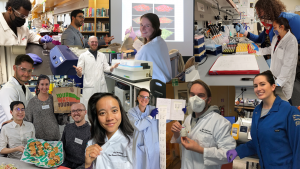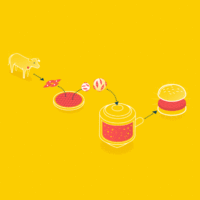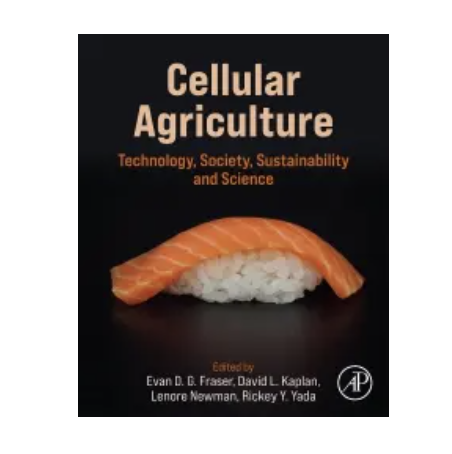- Overview
- Background
- Meet the Fellows
Overview
The New Harvest Fellowship Grant is for forward-thinking graduate or postdoctoral researchers in cellular agriculture who want to be leaders in the field. The fellowship provides dedicated research funding, an international support system, and leadership opportunities. Beyond just research funding, the overarching goal is to empower future technical leaders in the field.
Established in 2015, the New Harvest Fellowship seeks to address two major challenges in the field: a lack of specific talent and knowledge. The program has funded 28 Fellows to date.
The Fellowship has funded the world's first cultured meat PhDs, led to 50+ peer-reviewed publications, and laid the groundwork for cell ag research institutes around the world.
New Harvest alumni have co-founded companies, won government grants, and mentored dozens of students. They comprise the cellular agriculture vanguard.
Meet the Fellows

Get to know the New Harvest Fellows
Learn about their research projects
Open Sourcing the Fellowship
When we started the New Harvest Fellowship, nothing like it existed in this field. Training opportunities for students interested in cellular agriculture were close to non-existent.
Recently, we’ve been increasingly approached by other funders looking to provide training opportunities in cell ag and other fields. In the spirit of open sharing, we’re made these resources open for anyone! These documents cover our approach, the application process, and the nitty gritty details of how it runs. We hope these resources help other organizations interested in funding early-stage researchers in novel fields get grant programs off the ground!
1) Program Goals and Outcomes
2) Application Process
3) Program and Community Logistics
Applying to the Fellowship
We are not accepting applications for the Fellowship at this time.
Sign up for our newsletter to receive updates about future opportunities to apply for the Fellowship.
Are you interesting in financially supporting the fellowship? Reach out to Bre Duffy to discuss opportunities to support a fellow.
See More Initiatives

Artificial Intelligence and Machine Learning in Cellular Agriculture
Cost and scale are major blockers to cellular agriculture's success, but they are complex technical and economic challenges. Artificial intelligence (AI) and machine learning (ML) techniques could help to accelerate much of this work, but there is very little public literature on the various applications and benefits. Given the potential exponential impact of AI/ML, New Harvest and Alberta Machine Intelligence Institute (Amii) launched the AI in Cell Ag Initiative.

Safety Initiative Phase III: Precompetitive Collaboration on Safety Research and Methods Development
The Cultured Meat Safety Initiative (CMSI) is a joint initiative between New Harvest and Vireo Advisors aiming to address critical technical, methodological, and informational challenges related to evaluating the safety of cultured meat (CM) products.
CMSI involves the convening of diverse stakeholders, including industry, governmental scientists, regulators, academic researchers, and others. Gaining such varied perspectives advances public knowledge and the practice of food safety for CM products by identifying and addressing data gaps. Research conducted to develop data and methods build the necessary support elements for the emerging ecosystem, which can raise regulatory and consumer confidence, support industry efforts toward commercialization, and improve the efficacy of evaluation processes of regulatory safety reviews.
Building on progress from Phase I and Phase II of CMSI, New Harvest and Vireo Advisors are now working to convene diverse stakeholders to create the infrastructure for shared knowledge, methods, and data that address the priorities identified in Phase I and II. Our long-term goal is to coordinate and launch regional efforts to develop and validate analytical methods for CM safety analysis and use these methods to generate datasets that can be made publicly available to support transparent food risk assessments and policy-making processes.

The Foundational Cellular Agriculture Textbook
Cellular Agriculture: Technology, Society, Sustainability and Science was designed to be the go-to reference for everyone in cellular agriculture - the textbook found in every company’s office, in every university lab, and in every aspiring student’s backpack.
The text provides a state-of-the-art review of cellular agriculture technologies, presenting foundational information with practical application insights. There are chapters on regulatory and policy issues, as well as reviews of the sustainability challenges of alternative proteins.
It is the first resource of its kind to take a practical approach to review the design, feasibility, and implementation of cellular agriculture techniques. With additional chapters on life cycle analyses and ideal transition scenarios, this book provides a resource for aspiring technology developers and academics alike seeking evidence-based assessments of the industry and its disruptive potential. The textbook was written by industry and academic experts for a balanced perspective of the field today and to inspire and shed light on a path forward.

